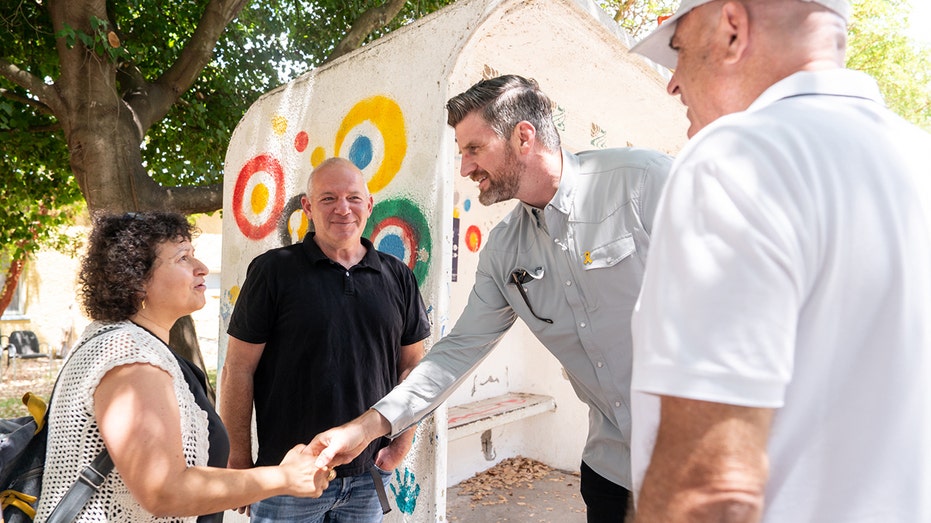Exclusive: Samaritan's Purse Provides Critical Relief to Refugees in War-Torn Israel
Edward Graham tours Israel’s war zones as Samaritan’s Purse delivers armored ambulances and builds trauma centers to support terror-affected communities.

In a nation grappling with the ongoing threat of war on two borders, the humanitarian efforts of Samaritan’s Purse are providing critical support to communities ravaged by violence and living under the constant shadow of conflict. The U.S.-based Christian aid organization has ramped up its operations, establishing armored ambulance stations and pledging to build trauma recovery centers in regions most affected by recent attacks.
Edward Graham, chief operating officer of Samaritan’s Purse and grandson of renowned evangelist Rev. Billy Graham, conducted an intense visit to both Israel's northern and southern frontlines on June 2. He met with survivors, first responders, and leaders striving to rebuild towns devastated by strikes from militant groups including Hezbollah and Hamas. During his visit to Arab al-Aramshe—a border community struck repeatedly by missiles and drones—Graham emphasized the group’s mission: “We go where other people don’t or won’t. Not just because we love you, but because God loves you.”
The scars of violence are still visible in villages like Arab al-Aramshe, where a drone attack recently destroyed a community center, costing a resident his life. Amid this devastation, Samaritan’s Purse has begun construction on a new ambulance station nearby in Shlomi, poised to serve the embattled local population. Graham pointed out that these communities have often been overlooked in international aid responses, but reaffirmed his organization’s commitment: “Samaritan’s Purse hasn’t forgotten them. We’ve got great relationships with local leaders and churches. These people are hurting. That’s why we’re here—to let Israel know they’re not forgotten.”
In partnership with Israel’s Magen David Adom national emergency service, Samaritan’s Purse is delivering 42 ambulances—including 28 armored vehicles—to support frontline medical response. One of these armored ambulances now serves Arab al-Aramshe, a resource local medics say is invaluable. “We are not afraid to respond. But now we will feel safe when we respond,” shared Ali Wahid, a senior medic in the region.
Beyond immediate life-saving interventions, the group’s strategy includes building ambulance exchange points—secure locations to store and deploy emergency vehicles quickly during attacks. Local officials, like Moshe Davidovitz, mayor of the Matte Asher Regional Council, underline how crucial these efforts are in encouraging displaced families to return and rebuild their lives. “Thousands of people evacuated. They are refugees in their own country. We need to provide some safety if we want people to come home and communities to grow again,” Davidovitz stated.
The impact of violence extends south as well. In places like Nir Oz, heavily damaged during the October 2024 Hamas attacks, the wounds remain fresh. Among the burned homes and haunting reminders of loss, Graham pledged assistance for a new community clinic and resilience center. The effort aims to address both the physical and emotional trauma inflicted during the massacres, where nearly a quarter of the kibbutz’s residents were killed or abducted. Mayor Michal Uziyahu, whose Eshkol region lost 244 people, insisted, “We are determined to make sure that the tragedy won’t define us. This place will be filled with life again.”
To further support recovery, Samaritan’s Purse is constructing resilience centers in Eshkol and Merhavim, areas home to thousands of children who have experienced harrowing trauma. Additionally, the group is building two emergency medical service (EMS) stations near the Gaza border, specifically targeting locations where medics previously could not reach victims in time. Twenty-five bomb shelters—11 in the north and 14 in the south—are also being installed as an extra layer of protection for vulnerable communities.
For many families, like Sara Kleiman and her young son, returning home after months of displacement is both an act of faith and a sign of hope. Kleiman expressed the resilience of so many in these embattled areas: “We try not to think about what could happen. But we wanted to come home. This is our home.”
In the face of relentless violence, the work of Samaritan’s Purse offers tangible hope, safety, and a reminder of global solidarity. As communities begin the arduous process of rebuilding, the presence of armored ambulances, trauma centers, and bomb shelters signals a renewed commitment to restoring life and dignity—a defiant message that these towns will not be defined by tragedy, but by the strength and compassion of those determined to help.




